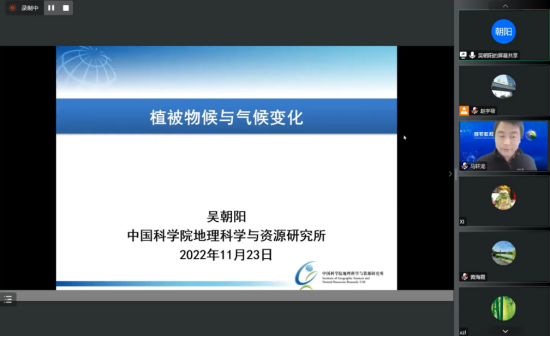at the invitation of researcher ma xuanlong and professor wu xiaodan from the key laboratory of western china’s environmental systems, college of earth and environmental sciences, lanzhou university. wu chaoyang, a researcher from the institute of geographical resources of the chinese academy of sciences, gave an online academic report entitled "research on vegetation phenology and climate change" to teachers and students of our university. the report was chaired by researcher ma xuanlong from the college of resources and environment of lanzhou university, more than 100 teachers, undergraduates, and graduate students from lanzhou university and related universities and research institutes attended the lecture.

with the intensification of global climate change and the rising concentration of co2 in the atmosphere, the phenological period of global vegetation, especially in the middle and high latitudes of the northern hemisphere, has changed significantly. the response of vegetation phenology to environmental conditions such as global warming will have an important impact on the photosynthesis of global vegetation and terrestrial carbon sinks. this topic has become an important topic in the field of vegetation ecology research. professor wu chaoyang first introduced the importance of vegetation phenology research, as well as the methods and scales of vegetation phenology observation. secondly, starting from the work of the research group in the past three years, the results of its research on the interaction mechanism between spring phenology and autumn phenology and climate change are introduced. regarding spring phenology, researcher wu chaoyang pointed out that spring temperature increase and cold stimulation (low-temperature stimulation in winter) can promote the early spring leaf-laying period of plants, and the modeling proved that the weakening of cold shock will reduce the early range of vegetation leaf development by about 50%, but take into account the uncertainty caused by the sensitivity of ecosystem productivity to phenology. in addition, through the analysis of wind speed change on the spring leaf spreading period, it is concluded that whether from remote sensing observation or ground flux data, the increase of wind speed and the early spring leaf spreading period are obviously positively correlated, that is, the increase of wind speed will delay the spring leaf spreading period. after research, this is related to soil temperature, soil moisture, and temperature difference between day and night. furthermore, by studying the impact of frozen soil on the qinghai-tibet plateau on gpp (gross primary productivity), wu chaoyang concluded that the start of thai wing (sot) of the frozen soil on the qinghai-tibet plateau is negatively correlated with spring gpp, and in some places, the contribution of sot exceeds the impact of climate change on spring gpp.

for autumn phenology, researcher wu chaoyang pointed out that diurnal temperature has an adverse effect on autumn phenology, which may be related to water stress and strong sensitivity to water, and pointed out that the future autumn leaf fall period will start earlier than expected. similarly, it has been suggested that weakening wind speeds prolong autumn phenology. finally, the influence of vegetation on the permafrost of the qinghai-tibet plateau is pointed out. prof. chaoyang wu's in-depth and colorful explanations enabled teachers and students to understand the response mechanism of vegetation phenology to climate change, and deeply appreciate the importance of vegetation phenology research to ecosystem and climate change research.
after the report, prof. chaoyang wu and a number of teachers and students had a full discussion on the relationship between vegetation phenology, climate change, and ecosystem, and looked forward to the possible future development direction of vegetation phenology from multiple perspectives. this report enriched the students' understanding of the field of vegetation phenology research and left a deep impression on the teachers and students present.
lecturer profiles:
wu chaoyang, institute of geographical resources, chinese academy of sciences, researcher, jie qing. his research focuses on vegetation phenology change and ecosystem carbon cycling. he has presided over projects such as the youth fund, general fund, outstanding youth fund, outstanding youth fund, and key research and development projects of the natural science foundation committee. first or newsletter has published more than 60 sci papers, mainly including nature climate change, nature communications, pnas, global change biology, and other journals.